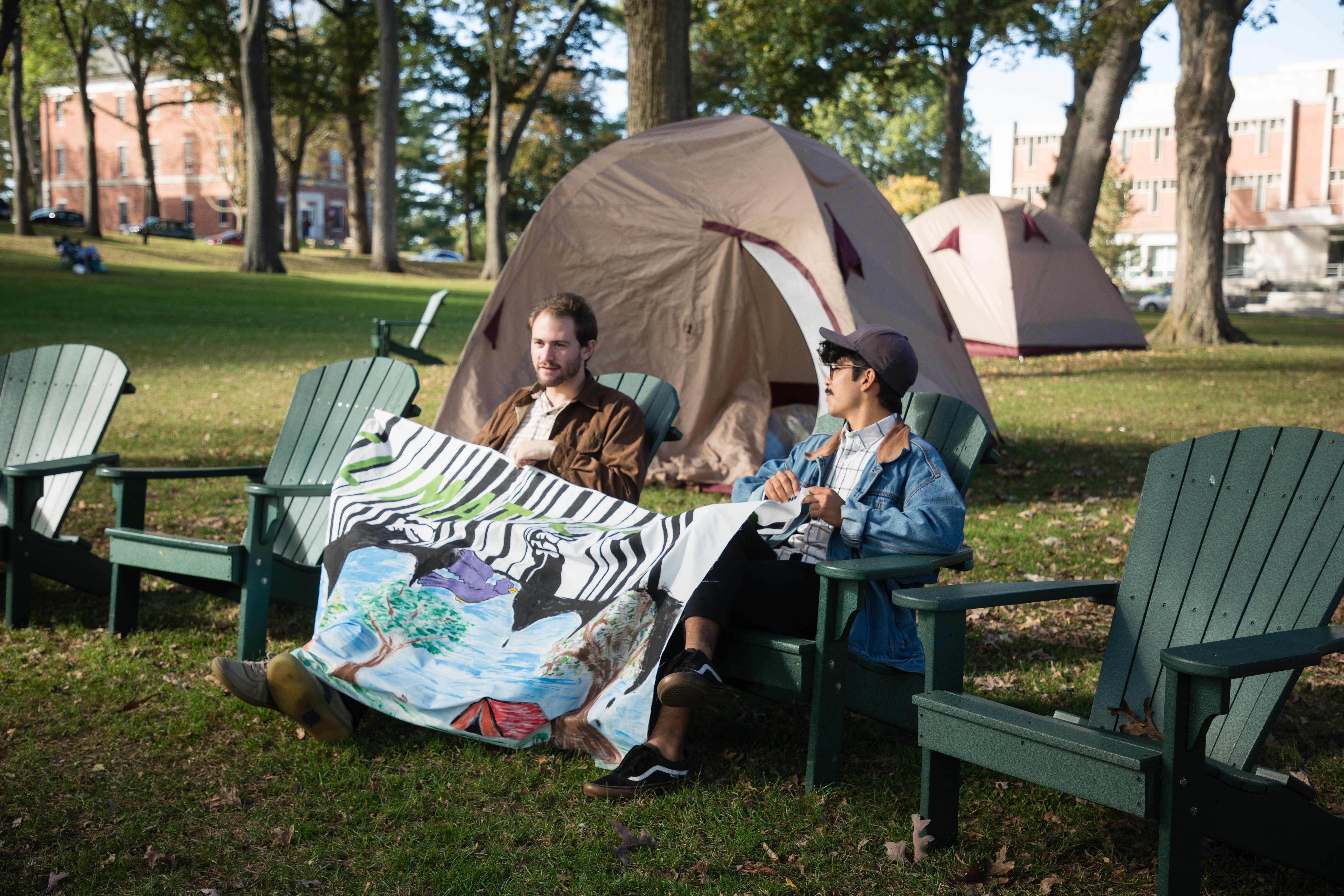

Direct Action Coordinating Committee (DACC), a student-run group that aims to promote student rights and social justice on campus, hosted a three-day event called Climate Camp on Oct. 11-13. The event, intended to raise campus-wide awareness and support for divestment of the college’s endowment from fossil fuels and indirect investments in private prisons, took place as a camp-out on the First-Year Quad.
The event is part of DACC’s ongoing push for the college’s divestment from sources the group deems problematic, namely investments linked to fossil fuels or private prisons. On the event’s Facebook page, organizers wrote that “DACC believes that the word ‘climate’ does not only have an ecological meaning. ‘Climate’ is also the climate of racialized violence … and the climate of our campus.”
The event began with opening remarks and a debate between representatives from the Amherst College Democrats, Amherst College Republicans and DACC. Their dialogue focused on the merits of a divestment-focused strategy for the college, international environmental agreements and other questions raised by climate change.
DACC encouraged students to participate in “fossil fuel-free fun” on Thursday afternoon, hosting a group bicycle ride to a permaculture garden at UMass Amherst and a community soccer game. Later that evening, DACC held a divestment teach-in, where organizers led a discussion on the impacts of the college’s investment in the fossil fuel and private prison industries.
DACC member Crystal Ganatra ’19 guided the discussion, which covered the history of the private prison industry and its connections to the fossil fuel industry before moving to a discussion of the college. Amherst “puts their money in a thing that is destroying the planet and also receives money from companies that profit from putting people in prisons, while also making the link that these communities that are affected [by the private prison industry] are the same communities that are affected by the fossil fuel industry,” particularly people of color, Ganatra said.
This teach-in was followed by a rally outside of a Board of Trustees meeting, during which a student-led pro-divestment petition was presented.
President Biddy Martin has denied claims that the college’s endowment is directly invested in private prisons after demands for divestment were raised during a student protest on Nov. 16, 2016. More recently, Chief Investment Officer Mauricia Geissler also said that the college was not invested in private prisons, responding to an opinion piece published in The Student. Contributor Bryan Doniger ’18 later retracted the claim but added that the college invests in companies with holdings in the private prison industry.
On the final day, DACC held a panel showcasing local environmental activists, including divestment leaders from other Five College institutions and Climate Action Now, a grassroots organization based in Western Massachusetts. Esperanza Chairez ’19, a member of DACC who assisted in organizing Climate Camp, said that they planned the panel so that Amherst students could learn from the experiences of “other people who have done this a lot longer than us.” Later that night, the three-day event culminated in an open-mic Coffee Haus, which was moved from its typical location in Marsh to the First-Year Quad.
Although Climate Camp drew participation and support from several student organizations on campus, including political and affinity groups, it was primarily coordinated by DACC, a small group of student activists that adhere to a “horizontalist” approach to their organization. Chairez explained that this meant a group structure where “no one is in charge of one another, [where students] show up as individual agents, ready to act as an individual,” with no formal hierarchies or assigned roles within the organization.
Through this egalitarian structure, Chairez said, DACC members hope to avoid replicating the hierarchical nature of institutions they are working to dismantle while also allowing members to “have an equal stake in what [they’re] doing.”
Though Ganatra said that she does not expect DACC to plan a similar event in the future, they are considering ways to “escalate” their divestment campaign. Ganatra added that she hopes DACC will maintain connections with the environmental organizers who participated in the panel.
“I think something we’ve also learned is that a lot of energy does go into divestment,” Chairez said. “I personally — and this might be just me, not necessarily a group consensus or anything — think it’s important to not become a single-issue group … because as cool of an event as it was, it drained our energy.”
Chairez remained optimistic about DACC’s ability to foster awareness and create change on campus. “I always hear a lot of people say, ‘There’s nothing we can do, you know, under our current administration — it feels like you’re constantly trying to kill a twenty-headed hydra at all times, because something new pops up, and it can make you feel desperate,” said Chairez. “Being in a group that is committed to addressing those things … is something you can do, and should do, if you have the desire to do something.”